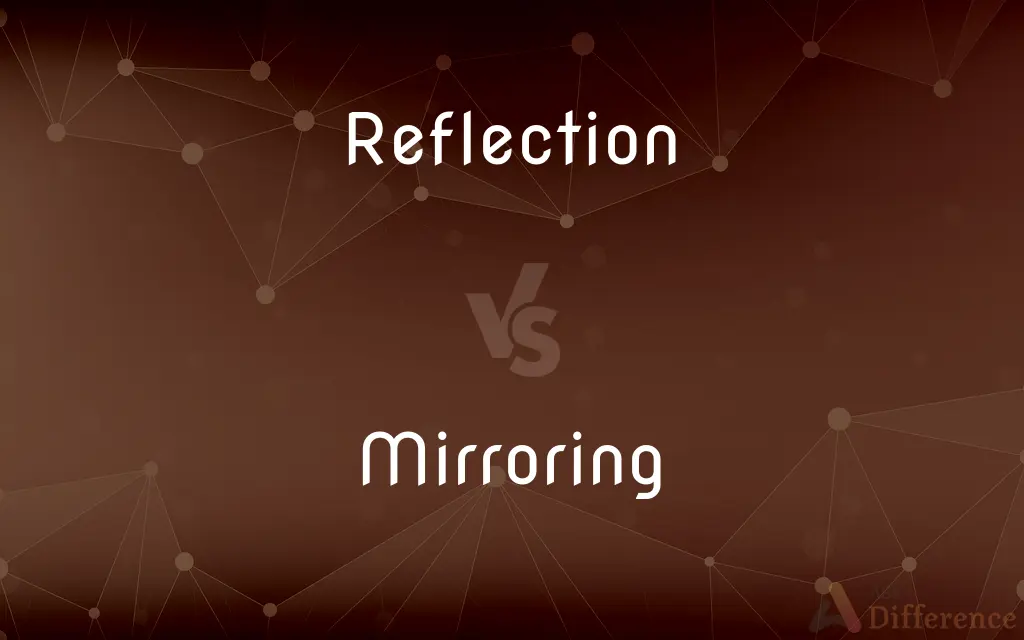Reflection vs. Mirroring — What's the Difference?
By Tayyaba Rehman & Fiza Rafique — Updated on March 13, 2024
Reflection involves the return or change of light, sound, or heat from a surface, while mirroring is the act of closely imitating or replicating something.

Difference Between Reflection and Mirroring
Table of Contents
ADVERTISEMENT
Key Differences
Reflection occurs when waves (like light or sound) bounce back from a surface, altering their path and sometimes their properties. This can lead to changes in the direction, intensity, and nature of the reflected waves, providing information about the surface or medium they interact with. On the other hand, mirroring is a concept that extends beyond physical reflection, often used in psychology, communication, and technology. In psychology, mirroring refers to the subconscious imitation of another person's gestures, speech patterns, or attitudes, which can foster empathy and rapport.
Mirroring, while it can involve the creation of a reflective image (as in a mirror), more broadly includes any act of copying or emulating. This can occur in social interactions, where individuals mirror body language or emotions to build connection or empathy. It also happens in digital environments, where data is mirrored across devices or networks to ensure consistency and backup.
In terms of physics and optics, reflection is governed by laws such as the law of reflection, which states that the angle of incidence equals the angle of reflection. This principle is critical in designing optical devices and understanding natural phenomena. Mirroring, when related to physical reflection, also adheres to this law, but in its broader applications, it is guided by principles relevant to the context, such as psychological theories in social mirroring or technical protocols in data mirroring.
Reflection and mirroring, while interconnected, serve distinct purposes across different fields. Reflection is a physical phenomenon that can be precisely measured and predicted, playing a crucial role in optics and other scientific areas. Mirroring, however, often involves a component of human behavior or technological strategy, requiring an understanding of psychology or systems design in addition to physical principles.
Comparison Chart
Definition
The return of light, sound, or heat from a surface.
The act of imitating or replicating something closely.
ADVERTISEMENT
Primary Field
Physics
Psychology, Communication, Technology
Key Principles
Law of reflection (angle of incidence = angle of reflection)
Emulation, Duplication
Applications
Optics, Acoustics, Seismology
Data Backup, Social Interaction, User Interface Design
Contextual Use
Describes a physical phenomenon
Used in both physical and metaphorical contexts
Compare with Definitions
Reflection
Physical Phenomenon
The reflection of sunlight off a mirror can illuminate a dark room.
Mirroring
Imitation
Mirroring someone's body language can build rapport in a conversation.
Reflection
Surface Interaction
Smooth surfaces produce clearer reflections than rough surfaces.
Mirroring
Digital Replication
Screen mirroring allows your smartphone's display to appear on a larger screen.
Reflection
Change in Direction
The angle of reflection of a laser beam depends on the surface it hits.
Mirroring
Psychological Technique
Therapists often use mirroring to create a sense of empathy with clients.
Reflection
Wave Behavior
Reflection can involve not just light, but also sound and water waves.
Mirroring
Data Redundancy
Data mirroring is essential for backing up critical information across multiple drives.
Reflection
Information Source
Reflections in optics can provide critical information about object
Mirroring
Behavioral Synchronization
Couples often mirror each other's gestures subconsciously, indicating closeness.
Reflection
The act of reflecting or the state of being reflected.
Mirroring
Mirroring is the behavior in which one person unconsciously imitates the gesture, speech pattern, or attitude of another. Mirroring often occurs in social situations, particularly in the company of close friends or family.
Reflection
Something, such as light, radiant heat, sound, or an image, that is reflected.
Mirroring
A surface capable of reflecting sufficient undiffused light to form an image of an object placed in front of it. Also called looking glass.
Reflection
Serious thinking or careful consideration
Engaged in reflection on the problem.
Mirroring
Something that faithfully reflects or gives a true picture of something else.
Reflection
A thought or an opinion resulting from such thinking or consideration
Wrote down her reflections.
Mirroring
Something worthy of imitation.
Reflection
An indirect expression of censure or discredit
A reflection on his integrity.
Mirroring
To reflect in or as if in a mirror
"The city mirrors many of the greatest moments of Western culture" (Olivier Bernier).
Reflection
A manifestation or result
Her achievements are a reflection of her courage.
Mirroring
Present participle of mirror
Reflection
The folding of a membrane from the wall of a cavity over an organ and back to the wall.
Mirroring
A reflection or inversion.
Reflection
The folds so made.
Reflection
The act of reflecting or the state of being reflected.
Reflection
The property of a propagated wave being thrown back from a surface (such as a mirror).
Reflection
Something, such as an image, that is reflected.
The dog barked at his own reflection in the mirror.
Reflection
Careful thought or consideration.
After careful reflection, I have decided not to vote for that proposition.
Reflection
An implied criticism.
It is a reflection on his character that he never came back to see them.
Reflection
(computing) The process or mechanism of determining the capabilities of an object at run-time.
Reflection
(anatomy) The folding of a part; a fold.
Reflection
The act of reflecting, or turning or sending back, or the state of being reflected.
The eye sees not itself,But by reflection, by some other things.
Reflection
The reverting of the mind to that which has already occupied it; continued consideration; meditation; contemplation; hence, also, that operation or power of the mind by which it is conscious of its own acts or states; the capacity for judging rationally, especially in view of a moral rule or standard.
By reflection, . . . I would be understood to mean, that notice which the mind takes of its own operations, and the manner of them, by reason whereof there come to be ideas of these operations in the understanding.
This delight grows and improves under thought and reflection.
Reflection
Shining; brightness, as of the sun.
Reflection
That which is produced by reflection.
As the sun water we can bear,Yet not the sun, but his reflection, there.
Reflection
A part reflected, or turned back, at an angle; as, the reflection of a membrane.
Job's reflections on his once flourishing estate did at the same time afflict and encourage him.
Reflection
Censure; reproach cast.
He died; and oh! may no reflection shedIts poisonous venom on the royal dead.
Reflection
The transference of an excitement from one nerve fiber to another by means of the nerve cells, as in reflex action. See Reflex action, under Reflex.
Reflection
A calm lengthy intent consideration
Reflection
The phenomenon of a propagating wave (light or sound) being thrown back from a surface
Reflection
Expression without words;
Tears are an expression of grief
The pulse is a reflection of the heart's condition
Reflection
The image of something as reflected by a mirror (or other reflective material);
He studied his reflection in the mirror
Reflection
A likeness in which left and right are reversed
Reflection
(mathematics) a transformation in which the direction of one axis is reversed
Reflection
A remark expressing careful consideration
Reflection
The ability to reflect beams or rays
Common Curiosities
What is the main difference between reflection and mirroring?
Reflection refers to the physical bouncing back of waves from surfaces, whereas mirroring involves the act of imitation or duplication, either physically or metaphorically.
What role does reflection play in technology?
Reflection is crucial in optical technologies, such as lasers and cameras, where controlling the path of light is essential for functionality.
Can mirroring occur without a physical mirror?
Yes, mirroring can occur in behaviors, emotions, and digital data replication, without involving a physical mirror.
Is mirroring always a conscious behavior?
No, mirroring can be both a conscious strategy and a subconscious behavior in human interactions.
Why is mirroring important in psychology?
Mirroring builds empathy and rapport in social interactions by subconsciously imitating another person's body language or emotions.
How does the law of reflection apply to mirroring?
In the context of physical reflection, mirroring adheres to the law of reflection where the angle of incidence equals the angle of reflection. In metaphorical contexts, the law doesn't apply.
What is screen mirroring in technology?
Screen mirroring involves displaying the content of one device's screen on another, larger screen, often wirelessly.
How does reflection contribute to the understanding of physical phenomena?
Reflection helps in studying properties of materials, designing optical devices, and understanding natural occurrences.
Can mirroring improve relationships?
Yes, mirroring body language and emotions can enhance understanding and connection between individuals.
Can reflection occur with all types of waves?
Yes, reflection can occur with various types of waves, including light, sound, and water waves, depending on the surface and medium.
How do rough and smooth surfaces affect reflection?
Smooth surfaces produce clear reflections, while rough surfaces scatter light, resulting in diffuse reflection.
How is data mirroring used in computer science?
Data mirroring involves creating exact copies of data across multiple storage devices to ensure data integrity and availability.
What is the significance of the angle of incidence in reflection?
The angle of incidence determines the angle at which light or other waves are reflected, essential in optical design.
Does mirroring have cultural implications?
Yes, mirroring can reflect and influence cultural norms and interpersonal dynamics, varying across different social contexts.
In what ways is digital mirroring beneficial?
Digital mirroring ensures data redundancy, preventing data loss and facilitating easy access across devices.
Share Your Discovery

Previous Comparison
Unbound vs. Bound
Next Comparison
Serious vs. SiriusAuthor Spotlight
Written by
Tayyaba RehmanTayyaba Rehman is a distinguished writer, currently serving as a primary contributor to askdifference.com. As a researcher in semantics and etymology, Tayyaba's passion for the complexity of languages and their distinctions has found a perfect home on the platform. Tayyaba delves into the intricacies of language, distinguishing between commonly confused words and phrases, thereby providing clarity for readers worldwide.
Co-written by
Fiza RafiqueFiza Rafique is a skilled content writer at AskDifference.com, where she meticulously refines and enhances written pieces. Drawing from her vast editorial expertise, Fiza ensures clarity, accuracy, and precision in every article. Passionate about language, she continually seeks to elevate the quality of content for readers worldwide.















































